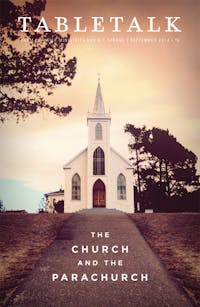
Request your free, three-month trial to Tabletalk magazine. You’ll receive the print issue monthly and gain immediate digital access to decades of archives. This trial is risk-free. No credit card required.
Try Tabletalk NowAlready receive Tabletalk magazine every month?
Verify your email address to gain unlimited access.
Since I’ve spent the majority of my professional career as a teacher of Scripture, philosophy, and theology, I’ve often had the opportunity to think about matters of pedagogy and other issues related to instruction. One thing that’s always struck me as I have considered what it means to be an effective teacher is that most of the great teachers in history were themselves students of other great instructors. Socrates taught Plato; Plato taught Aristotle; and Aristotle taught Alexander the Great. The entire history of Western ideas has been affected by these four men. In theology, we see that Ambrose of Milan taught Augustine, and Augustine, through his writings, taught both Martin Luther and John Calvin. We owe a great debt to Ambrose, who by discipling Augustine got the ball rolling for the Reformation, in a manner of speaking.
That great teachers produce other great teachers tells us that we can’t take the search for a teacher lightly. In fact, our choices of the instructors under whom we sit are among the most crucial and life-altering decisions we will ever make. We should take great care in selecting our instructors, particularly when we’re considering those who will train us for our vocations. I’ve seen too many young people choose a school because it had a beautiful campus or national championship football team, or because of its location. I’ve seen too many young men and women not consider the faculty when they are evaluating different options for higher education. Yet it is the faculty that matters most. These are the people who have a definitive impact on our future. We have to think carefully about who will be teaching us and what they will teach us at every stage of life, but particularly during our college years.
Several teachers during my undergraduate and graduate years of study had an impact on me that resonates to this day. As an undergraduate student, I chose philosophy as my major because I had a great philosophy professor as my faculty advisor. I was drawn to this man, Dr. Thomas Gregory, for his erudition and kindness. I ultimately ended up majoring in philosophy more out of my respect for the man than out of an innate affection for philosophy. I took every course that Dr. Gregory taught and, under his personal influence, developed a love for the history of ideas and the importance of logical thought.
When I was in seminary, I was privileged to have yet another incredible instructor—Dr. John Gerstner—who became my mentor in theology. He was instrumental in my decision to pursue doctoral studies. He insisted that I pursue a doctorate, and though I was initially reluctant, I told him that I would go on to further studies only if I could sit under the best teachers available. Imagine my surprise when Dr. Gerstner identified those individuals as G.C. Berkouwer and the faculty at the Free University of Amsterdam. After talking with Dr. Gerstner at length about it that day, I booked my family’s journey to the Netherlands the next. That decision was one of the most important decisions I have ever made, and I don’t regret it.
Three years ago, Ligonier Ministries opened Reformation Bible College to provide formal training in the things of God for young men and women. When we were planning the college, I was insistent that we hire the best faculty possible because I knew the quality of our education and its faithfulness to Scripture would be determined finally by our instructors and the material they would present to our students.
It’s ultimately no surprise that great teachers produce other great teachers. That seems to be the way God has designed us. In Scripture, we are called again and again to be disciples, or more precisely, learners. We need teachers if we are to learn, and great teachers raise up great learners who can then go on to produce other great learners. Christ is our preeminent example of this. Because He was a great teacher, He knew what to do in order to take a ragtag bunch of fishermen, Zealots, and tax collectors, and make them into the most influential bunch of learners the world has ever known. From their ranks we have been blessed with great teachers—Matthew, John, Peter, and others whose work continues to impact the world to this day. Of course, these men were inspired by the Holy Spirit in a manner that other teachers aren’t. However, Christ’s use of them to make disciples of all nations remains a model of how great teachers produce other great teachers.
No matter how great our earthly teachers may be, they will err. We will have to weigh their words against the Spirit-inspired teachings of the Apostles and prophets. But we dare not think we can ever reach a point where we cannot benefit from the teaching of others. Great teachers who are faithful to God’s Word are a blessing to God’s church. He will use them to build us up so that we can build up others.
